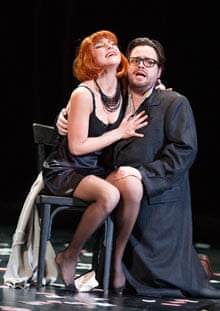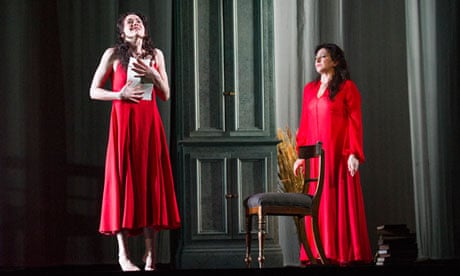Trees the colour of blood oranges, black georgette ballroom gowns rippling as if cast from jelly moulds, a snow scene whipped and blurred as you might see from a train crossing the Steppes: the Royal Opera House's new Eugene Onegin, conducted by Robin Ticciati, directed by Kasper Holten and designed by Mia Stensgaard, looks magnificent. In a production which has problems, visual coherence is one of its strengths.
Tchaikovsky's masterpiece, for many the nearest to perfection any opera gets, does not lend itself to updating. It is steeped in the Russia of Pushkin, whose 1833 verse novel is the basis for the libretto. In his first production for Covent Garden, Holten, director of opera for the ROH since 2011, places the action faithfully in that period, with an equal nod towards the 1870s when the opera was composed.
From the outset, however, he stamps his own ideas on the work, of which more shortly. First the music, aspects of which are strong. Simon Keenlyside in the title role brings virility to the unpleasant, usually buttoned-up hero. You can see why the teenaged Tatyana might fall for him, even if he is on the mature side. This Onegin delights in being louche, playful, arms folded, casual rather than stiff. He sings with flexibility, expression and, most of the time, a golden tone, suggesting more capacity for emotion than is usually evident: even brutes have their decent qualities.
The other pair of lovers have the right combination of innocence and ardour, the Slovakian tenor Pavol Breslik lyrical and intense as Lensky, the Russian mezzo Elena Maximova a vigorous Olga. But something was out of kilter in the orchestra pit. Ticciati's speeds were stop-start, lurching from too slow to breathless. There were some scrappy moments, and one ascending string scale at the first entry of the chorus that made you reach for your armrest. Whether first-night nerves got the better of this formidable orchestra or whether they were under-rehearsed it's hard to say. By the time the brass thundered out the final, fateful bars, matters had improved. Luckily the well-drilled chorus was outstanding and sounded authentically Russian.
The production used one fixed reveal: four full-height double doors opened and closed against various backdrops. Gerhard Richter and Hammershøi were the visual touchstones. Front projections created beautiful detail and ornament but must have been a nightmare for the brilliant Wolfgang Göbbel to light. He did a superb job, illuminating each moment with flair (or flare) and precision.
Holten, already a much liked and admired figure at the opera house, was artistic director of the Royal Danish Opera in his native Copenhagen, but also has an international reputation as a director. Hopes were high. Alas he found one notion and laboured it. Memory – for this was the idea – is already woven into plot, characters and, above all, music. Thematic material reappears throughout the opera. Onegin's own love awakening, years too late, uses the melody associated with the impetuous young Tatyana whom he had spurned at the start.
To underline his point, Holten gives the two main characters doubles. Tatyana, well sung by the experienced Bulgarian Krassimira Stoyanova, is paired with the physically expressive dancer Vigdis Hentze Olsen. Also dressed in red, she squeezes herself into an empty bookcase when not required and embodies the inner thoughts and feelings of the more self-contained Stoyanova. This makes a mockery of the vital Letter Scene. While Hentze Olsen enacts it all, attention is stolen from Stoyanova, who is left with nothing to do. Keenlyside's double (Thom Rackett) instead is of minimal interest but maximum distraction. His appearance at the duel turns it into a trio. The dead Lensky then remains on stage, even during the St Petersburg ball scene. The other main change was the appearance of Gremin (beautifully sung by Peter Rose) as witness to his young wife's final meeting with Onegin. The beauty of Tchaikovsky's original is that his anguish never needs spelling out.
A rousing, heel-and-toe polonaise or mazurka might have redressed the balance, but the dances were downplayed except the one in which Keenlyside swayed around surrounded by girls in "nighties" (they weren't nighties but it's hard to find an alternative word). All the cameo roles were expertly taken. The audience response was mixed. Holten will return, no doubt, with greater things, and once the musical performance tightens up, this will have the makings of a far better evening than we experienced on first night. See for yourself: the production will be live in cinemas on Wednesday 20 February.
You could point to flaws of equal severity in English National Opera's new staging of La traviata, and many have. It is radical in its reworking of Verdi's original, with extensive cuts, no interval and almost no scenery except red curtains and a chair. The veteran German director Peter Konwitschny, in his UK opera debut, has created a taut, gripping drama. He has shaken the work inside out without destroying it. Michael Hofstetter conducted a feverish and urgent performance, short on subtlety but bursting with emotion.

Violetta, the fallen woman of the title, becomes almost a femme fatale in the mould of Wedekind's Lulu. The American soprano Corinne Winters, in her European debut, looked great, moved well, acted smartly and sang terrifically. Turning into an Annie Get Your Gun type in the country scene, she wielded her pistol with style. Often her sour top notes turned into laughter or shrieks. Many will hate that. I found it a bold recognition that top notes, even properly sung, can often sound ugly.
The portrayal of Alfredo, sung with lovely lyricism by Ben Johnson as a bookish student in a duffel coat, was perplexing. Grouping Germont (Anthony Michaels-Moore, stirring and powerful), Alfredo and the doctor in the auditorium while Violetta dies on stage badly interrupted the action. Many things can come between a man and his dying lover, but a large orchestra in a pit is well-nigh insurmountable.
Yet the impact was hard-hitting. Both these productions – Onegin and Traviata – will provoke a certain amount of fury. Whereas you can permanently deface a picture in a gallery, the same is not true of music. Directors may abuse, rape or even dismember an opera but, miraculously, the score itself retains an unassailable virginity.

Comments (…)
Sign in or create your Guardian account to join the discussion